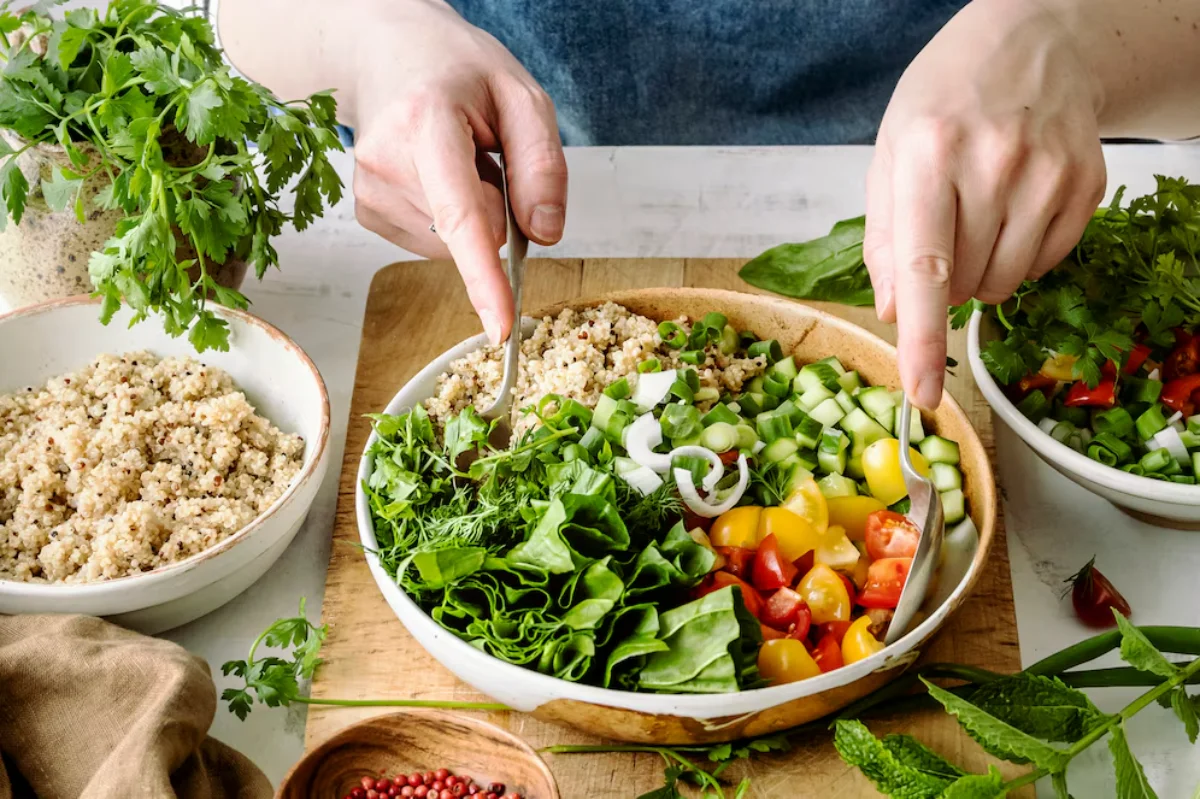
The Benefits of Plant-Based Eating
The rise of plant-based eating makes people more aware of its health and wellness benefits. A plant-based diet has many benefits, be they health-related, environmental, or ethical. Here, we discuss these benefits, explain how to get started with a vegan diet, and recommend top vegetarian foods to add to your meals.
Plant-based diets pay dividends, no question. As people learn how food choices affect health and the planet, they seek positive changes. Eating plant-based is a lifestyle choice, not a trendy diet, and it has long-term benefits. But switching to a plant-based life can feel overwhelming for first-timers. This guide features tips and insights to help you in this truly rewarding journey.

Key Benefits of a Plant-Based Diet
Why It Matters
Plant-based diets offer more than weight loss. They promote a holistic approach to health, covering physical, mental, and environmental well-being.
Health Benefits
- Improved Heart Health: A diet rich in fruits, vegetables, nuts, and whole grains lowers the risk of heart disease. These foods are low in saturated fats and cholesterol, key factors in heart issues.
- Weight Management: Plant-based diets often have fewer calories and more fibre, helping with weight loss and maintenance. The high fibre content helps you feel full, reducing overeating.
- Reduced Risk of Chronic Diseases: Research shows that plant-based diets can lower the risks of type 2 diabetes, certain cancers, and high blood pressure. Plant antioxidants and phytochemicals are vital for disease prevention.
Environmental Impact
- Sustainability: Plant-based diets use fewer resources than meat-heavy diets. They help cut greenhouse gas emissions, save water, and reduce deforestation.
- Biodiversity: Eating less meat supports biodiversity. This is essential for ecological balance and the survival of different species.
Ethical Considerations
- Animal Welfare: A plant-based diet aligns with concerns about animal welfare. It reduces the demand for factory farming, which often has poor conditions for animals.
- Conscious Consumption: Plant-based eating encourages mindful choices, promoting a stronger connection with food and its impact on the world.

How to Start a Vegan Diet
Assess Your Current Diet
Start by reviewing your eating habits. Identify foods you like and find plant-based alternatives. This will help you create a personalised transition plan.
Educate Yourself
Learn about the nutrition of a vegan diet. Research nutrients like protein, vitamin B12, iron, and omega-3s. Familiarise yourself with plant-based sources to ensure a balanced diet.
Gradual Transition
- Start Small: Add more plant-based meals to your routine. Begin with one or two meatless days a week and increase from there.
- Experiment with Recipes: Try new recipes and cuisines to keep meals interesting. Discover new flavours and textures to enjoy the transition.
- Substitute Wisely: Use plant-based options for your favourite animal products. For example, use almond milk instead of cow’s milk or tofu instead of chicken.
Plan Your Meals
Meal planning helps maintain a balanced vegan diet. Create a weekly menu with varied foods to meet your nutritional needs. This also prevents last-minute choices that could lead to unhealthy eating.
Seek Support
Join online or local groups of plant-based eaters. Sharing experiences and tips with others can motivate and support you during your transition.

Best Vegetarian Foods to Include
Legumes
Beans, lentils, and chickpeas are rich in protein, fibre, and vitamins. They are versatile and can be added to soups, and salads, or used as meat substitutes.
Whole Grains
Brown rice, quinoa, oats, and barley provide complex carbohydrates and fibre. They support sustained energy and are key to a balanced diet.
Nuts and Seeds
Almonds, walnuts, chia seeds, and flaxseeds offer healthy fats, protein, and essential micronutrients. They are great in smoothies, salads, or as snacks.
Leafy Greens
Spinach, kale, and Swiss chard are loaded with vitamins A, C, and K, iron, and calcium. Add them to meals for a nutrient boost.
Fruits
Berries, apples, bananas, and citrus fruits provide essential vitamins, antioxidants, and natural sugars. They make excellent snacks or breakfast options.
Additional Expert Tips & Common Mistakes to Avoid
Best Practices
- Diverse Diet: Ensure your diet includes a variety of foods for all nutrients. Variety is essential for health.
- Stay Hydrated: Drink enough water, especially with a high-fiber diet. It helps with digestion and nutrient absorption.
- Mindful Eating: Watch portion sizes and listen to your hunger cues. Mindful eating creates a healthier relationship with food.
Common Mistakes
- Over-reliance on Processed Foods: Limit heavily processed vegan foods, which may be high in sugars, salt, and unhealthy fats. Choose whole foods instead.
- Ignoring Nutritional Needs: Not planning for nutrients like vitamin B12 and iron can lead to deficiencies. Consider supplements if needed.
- Sudden Transition: Switching to a vegan diet too quickly can be stressful. Gradual changes are more manageable and sustainable.
Advanced Insights / Expert Recommendations
Personalised Nutrition
Think about consulting a nutritionist to tailor your plant-based diet. Personalised advice can address specific health needs and preferences.
Sustainable Practices
Look for local and seasonal produce to support sustainability. This will help reduce your carbon footprint and boost local economies.
Continuous Learning
Stay updated on the latest research in plant-based nutrition. Ongoing learning can improve your dietary choices and overall wellness.
Indulge in Healthy plant-based Eating Today
The benefits of plant-based eating are broad: health, environment, and ethics. What if you learn how to go vegan and then bring the best vegetarian foods with you? Hey, that sounds like a positive step towards healthier, sustainable living.
What action will you take today to help you continue reaping the rewards of plant-based eating?